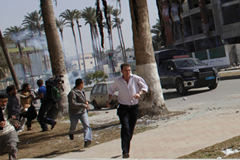Bill Neely
 A native of Glengormley, ITV News’ International Editor Bill Neely began his career as a freelancer. Without any formal journalism qualifications he signed up for shifts with the BBC. Covering the Troubles for both TV and radio ignited his interest in conflict and he has gone on to report on global events including the fall of the Berlin Wall, the attack on the World Trade Center, the war in Afghanistan and civil unrest in Libya.
A native of Glengormley, ITV News’ International Editor Bill Neely began his career as a freelancer. Without any formal journalism qualifications he signed up for shifts with the BBC. Covering the Troubles for both TV and radio ignited his interest in conflict and he has gone on to report on global events including the fall of the Berlin Wall, the attack on the World Trade Center, the war in Afghanistan and civil unrest in Libya.
How did you get started in journalism?
I had no formal journalistic training. I was thinking of becoming an actor but I knew my heart wasn’t entirely in it. I had nothing else planned but as I was about to leave Queen’s University I knew I had to earn some money. I asked for advice at the careers office where they told me there were summer vacancies in the BBC’s radio current affairs department.
I joined the BBC in Belfast as a freelance (with no training) at the height of the hunger strikes in 1981. I was given a tape recorder, told that I would be paid if I got any interviews that were broadcast and that’s how it all began. I lasted four months in Belfast, moved to Derry for four months and then back to Belfast, where I began to dig in and slowly, very slowly, to get regular shifts, then a regular job, first in radio current affairs, then radio news, then television news.
There’s no question that growing up in Northern Ireland and then reporting it gave me a training in and a taste for reporting conflict that has stood me in good stead for 30 years.
You have worked in radio and TV. What are the main differences and which do you prefer?
I like radio. There’s a wonderful freedom in just having a tape recorder and your own voice to paint sound pictures of the day’s events. But in the end it’s the combination of sound and pictures and words that inspires me. I think television news can have extraordinary impact. It’s how most people get their news. To edit a report that contains compelling images and to find just the right words to fit with them is a wonderful, daily challenge.
How is ITV News’ international coverage organised?
We have six bureaux around the world, with coverage co-ordinated by a foreign desk in London. Compared to the BBC’s many bureaux around the world, we are thinly stretched. But we fight hard. We make tough decisions about what to cover and what, sadly, we cannot go to and what has to be done from London. We box above our weight.
What has been the most difficult story you have worked on to date?
Wars are always hard. They’re about survival. When you are advancing with a British army unit like the Royal Marines, as I was in 2003 in the first days of the war, there’s only a very short time to actually do the journalism. You are busy jumping out of helicopters, humping equipment, running across open ground, scrambling into ditches under fire, then trying to eat, get enough sleep and work out how on earth you are going to get your story out of the battle zone and onto the news programme.
Sometimes it’s very hard to operate under the watchful eyes of a government, like Libya’s, that tries to censor you and restrict your movements. On other stories it’s hard to move around. Earthquakes are a perfect example. I’ve covered more than a dozen earthquakes now so I know what to expect and, believe me, it’s not easy. Other stories exact an emotional toll, like Beslan.
 What do you enjoy most about the job?
What do you enjoy most about the job?
As a journalist in Northern Ireland there was a dirty little secret: it was fun. Challenging yes, sometimes awful, but fun. The thrill of the call that led you into fast cars and a chase for the story, the sheer excitement of some of it, the (foolish) belief that, as journalists we were relatively safe – part of this was the young man’s belief in his own immortality!
No journalist worth his, or her, salt in Britain or Ireland should have been anywhere else but in Belfast. It was war in the United Kingdom. Democracy was being challenged by murderers, perverted by the authorities, there were legitimate grievances on both sides, a hidden, dirty war to uncover.
What more could any young journalist want? And for me it was a chance to bypass the tedium of journalism in any other part of the UK. No flower shows or obituary columns; it was straight to the funerals and obituaries as they happened. You wouldn’t have wanted to be anywhere else.
Today, the thrill of being on the front line of history remains. To be involved in the revolutions in the Middle East − albeit as a bystander − is extraordinary. But I also love doing my job with colleagues who are friends. We leave our hotel every day with a blank videotape and by the end we have a story to show the country. And once it has been sent to London, your job is over for the day.
It’s a daily challenge, long hours (in Libya recently it was 16 hours a day for nearly three weeks, non-stop) but the satisfaction of producing something at the end that really matters, that really shows people in the UK what’s going on, is wonderful.
How do you relax?
I love sport. I used to play football, but now I run, everything from 5K to a marathon. I did my first marathon last year, to celebrate being 50, and did it in three hours 23 minutes, which I was very pleased with.
I love wine and have a small cellar in my house. I love poetry and music. In Northern Ireland I was the drummer in a school, then university band. I love good food, great coffee but most of all I love doing all of this with my family, my wife and two lovely daughters. I am very lucky to have them and to have a wonderful career.





